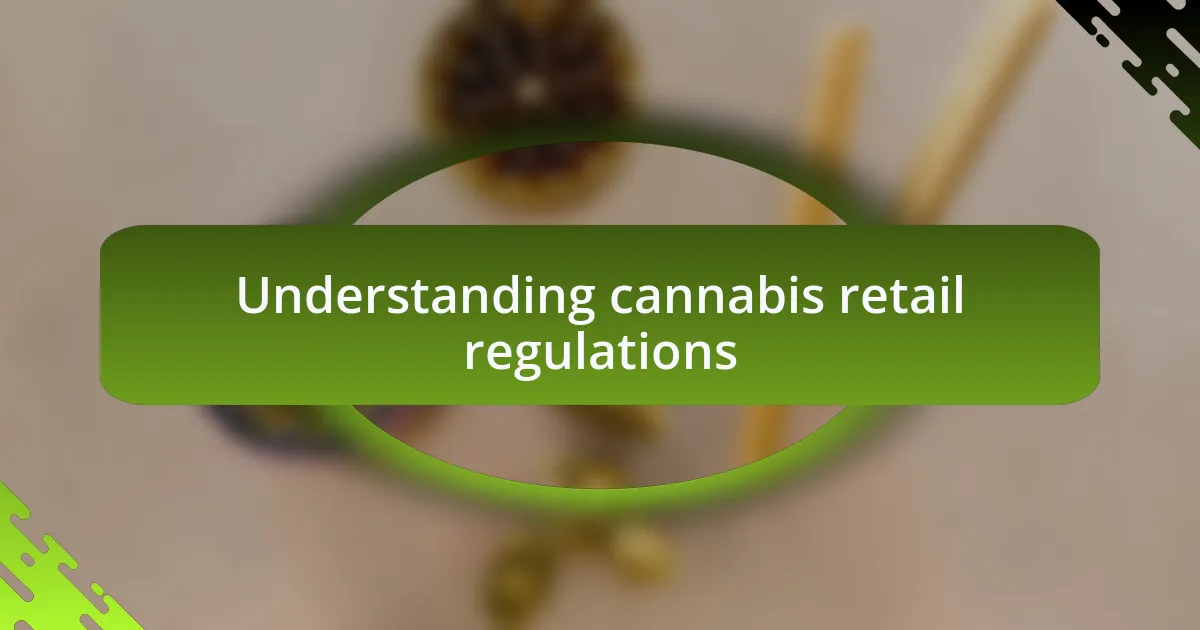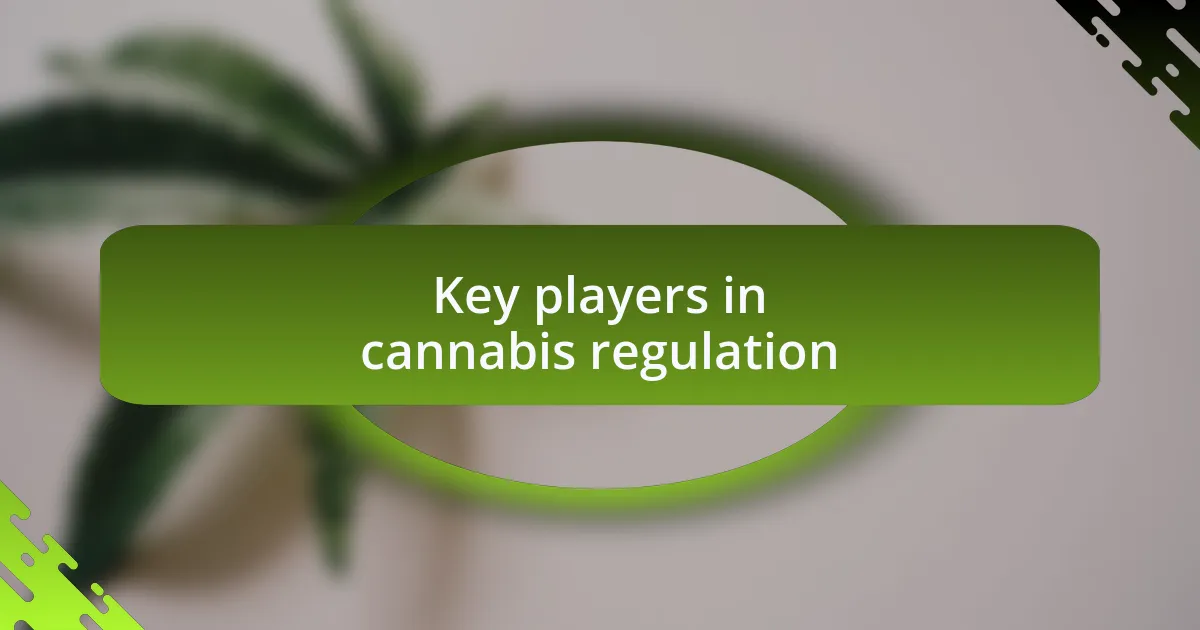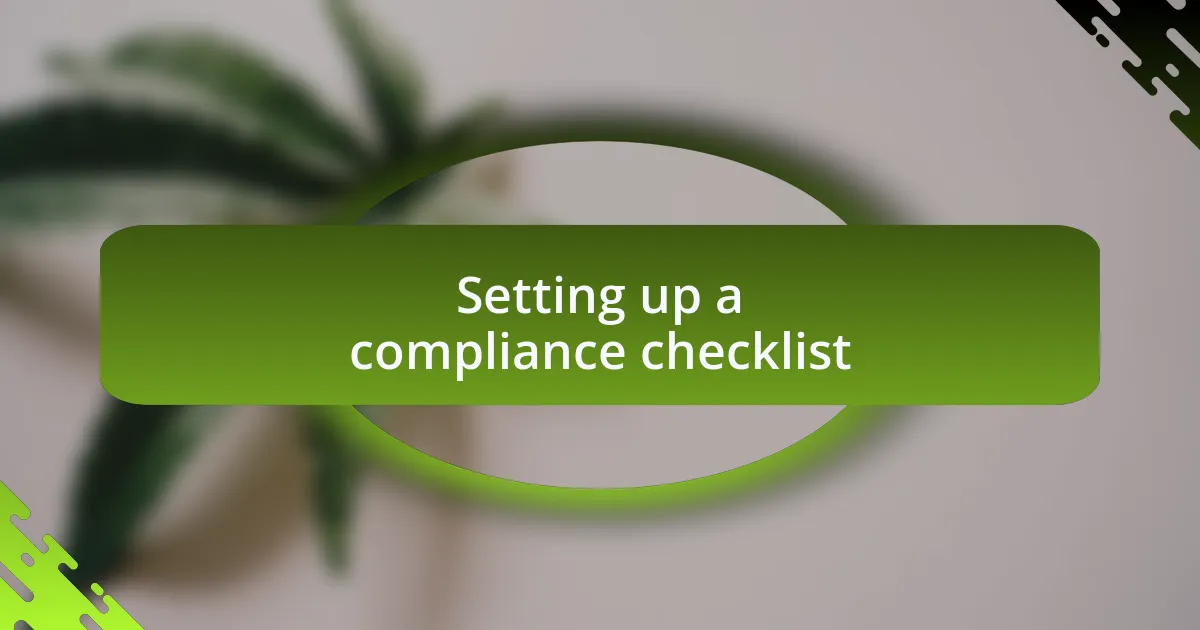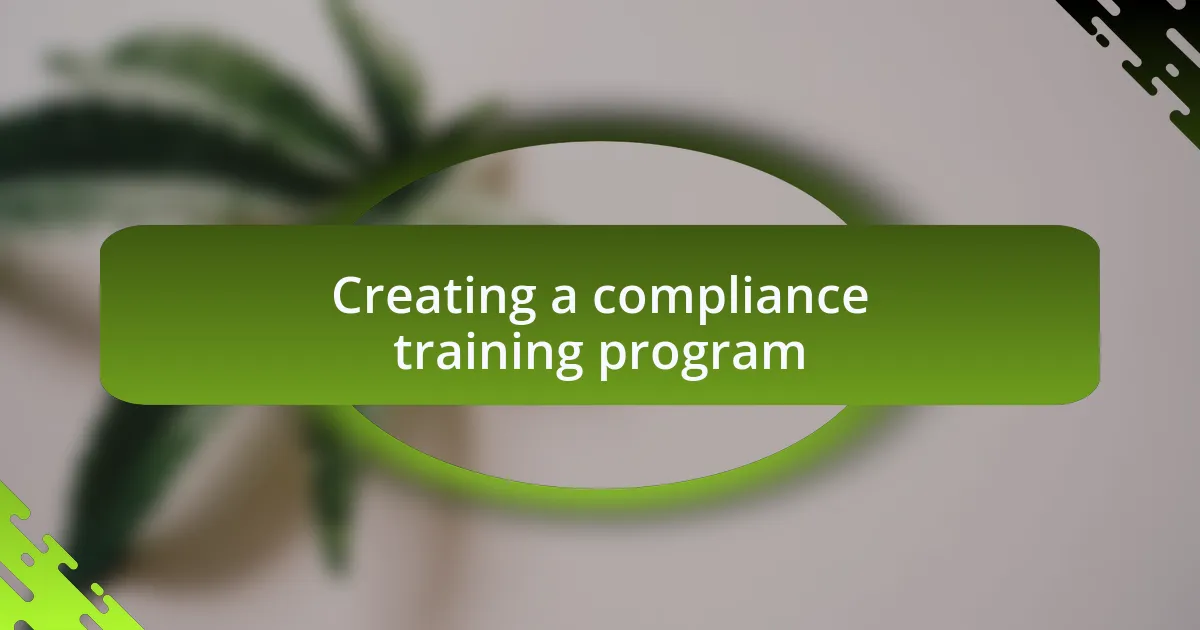Key takeaways:
- Understanding and prioritizing compliance in cannabis regulations builds customer trust and contributes to a safe environment.
- Engagement with local associations and industry events helps retailers stay informed about regulatory updates and fosters community connections.
- Creating a comprehensive compliance checklist and ongoing training program enhances team understanding and ensures adherence to regulations.
- Sharing experiences and best practices among professionals leads to innovative solutions and a supportive industry network.

Understanding cannabis retail regulations
Understanding cannabis retail regulations is crucial for anyone looking to succeed in this budding industry. I remember the first time I tried to navigate these regulations; it felt like trying to find my way through a maze without a map. Every state has its own set of rules that can change frequently, which can be overwhelming for newcomers.
When I delve into these regulations, I often ask myself how they impact not just compliance, but the overall customer experience. For instance, certain states require specific labeling on products to ensure transparency. This wasn’t just a checkbox for me; it became a guiding principle in how I structure my retail practices. I found that prioritizing compliance not only protects my business but also builds trust with customers who seek reliable information about what they purchase.
Moreover, engaging with local cannabis associations and attending industry conferences can provide invaluable insights into regulatory updates. I recall attending a seminar where I met industry leaders sharing their experiences with compliance. It was eye-opening to realize that staying informed is not just about following the law; it’s about fostering a deeper connection with the community, ensuring that we all advocate for sensible regulations together.

Importance of compliance in cannabis
The significance of compliance in the cannabis industry goes beyond legalities; it’s about creating a safe and trustworthy environment for consumers. I remember a time when a close friend voiced their concerns about purchasing cannabis from a dispensary. Their anxiety stemmed from not knowing if the products were tested for safety and potency. It was a stark reminder that our adherence to regulations is directly tied to consumer confidence and public health.
Each regulation serves a purpose, often born from lessons learned in the industry. For example, I once overlooked a minor compliance detail and faced a hefty fine. It was a wake-up call that every regulation, no matter how trivial it seems, is designed to protect both the business and its customers. This experience reinforced my belief that compliance should be viewed as an opportunity for growth rather than just a burden to bear.
Ultimately, I view compliance as a cornerstone of responsible cannabis retail. When businesses prioritize regulation, they not only safeguard their operations but also contribute to destigmatizing cannabis in society. It’s empowering to know that through diligent compliance, we can play a part in shaping perceptions and paving the way for a more informed community. How can we not see that as a powerful motivator?

Key players in cannabis regulation
Key players in cannabis regulation span various levels of government and organizations, each playing a crucial role in shaping policies. At the federal level, the Food and Drug Administration (FDA) is a significant player, overseeing the safety of cannabis products, especially edibles. I recall attending a seminar where an FDA representative emphasized the importance of rigorous testing; this made me realize how their strict guidelines directly impact product quality and consumer safety.
On a state level, agencies like the Department of Public Health or Bureau of Cannabis Control are pivotal in establishing regulations tailored to local needs. I remember a visit to a dispensary where the owner shared their experience dealing with state inspectors. Their accountability and transparency with regulators inspired me to adopt a similar mindset in my business practices. Doesn’t it make you think about how these interactions can lead to better understanding and collaboration?
Moreover, industry associations, such as the National Cannabis Industry Association (NCIA), advocate for fair regulations and provide resources to navigate compliance challenges. From my experience, engaging with these associations has opened doors to invaluable networking and education opportunities. Have you ever considered how these connections could empower your own business? They truly play a significant role in fostering a supportive environment in this evolving industry.
![]()
Tools for tracking regulatory changes
Staying updated on regulatory changes in the cannabis industry can be a daunting task, but tools like compliance management software have made it more manageable. I recall my first encounter with such software; it tracked updates across multiple jurisdictions and allowed me to tailor notifications based on specific interests. How amazing is it to have a digital assistant that keeps you informed without having to sift through endless emails or government websites?
Another effective method is subscribing to industry newsletters that aggregate regulatory updates from various sources. I used to miss key changes, but once I signed up for a couple of well-curated newsletters, my knowledge took a leap forward. Do you think staying informed through concise summaries could save you time and prevent future compliance mishaps?
Lastly, participating in webinars and forums can be incredibly beneficial. I remember joining a panel discussion hosted by industry experts who shared real-time insights and answered pressing questions. Engaging in such platforms not only enhances my understanding but also builds a sense of community. Have you ever thought about how collaboration with fellow professionals can drive better compliance practices in your business?

Setting up a compliance checklist
Setting up a compliance checklist is crucial for staying on top of regulatory requirements in the cannabis industry. When I first created my checklist, I didn’t realize how comprehensive it needed to be. I started with basic elements like licensing and labeling requirements, but soon learned that including details such as employee training and safety protocols was equally important. Have you ever felt overwhelmed by how much you need to monitor?
I recommend breaking down your checklist into categories that reflect the different aspects of compliance—like operational, product, and financial regulations. For instance, I found that by segmenting it this way, I could focus on one area at a time without losing sight of the bigger picture. Each category became a mini-project, and I felt a real sense of accomplishment as I ticked off items.
Lastly, don’t forget to revisit and update your checklist regularly. I learned this the hard way when I overlooked a seemingly minor change in packaging regulations. It ended up costing me time and resources to rectify the situation. How often do you think you should review these lists to keep them relevant and effective? I now make it a habit to review mine monthly, ensuring I’m always prepared for updates.

Creating a compliance training program
Creating a robust compliance training program is a vital step I’ve taken to ensure everyone on my team understands the regulatory landscape of the cannabis industry. Initially, I found it challenging to convey such complex information in a way that was engaging and easy to grasp. Have you ever faced the struggle of simplifying intricate rules for your employees? By breaking down regulations into relatable scenarios and real-life examples, I saw not just improved understanding but also a deeper commitment from my staff.
In my experience, integrating interactive elements, like role-playing and scenario-based discussions, kept the training sessions lively and effective. I remember a particular session where we simulated an inspection. The team was surprisingly engaged, and it highlighted areas we needed to improve upon that I hadn’t considered before. This kind of active participation really reinforces learning, don’t you think?
Moreover, I’ve learned the importance of ongoing training rather than one-off sessions. I periodically send out quizzes and updates when regulations change, ensuring compliance remains at the forefront of everyone’s mind. I can’t stress enough how rewarding it is to see my team take pride in their knowledge and feel empowered to navigate compliance confidently. What would it feel like to foster such a culture in your own team?

Sharing experiences and best practices
Sharing experiences and best practices often feels like a necessary rite of passage in the cannabis retail industry. Not long ago, during a networking event, I shared my approach to maintaining compliance with a fellow retailer. It was enlightening to hear how they navigated the complex regulations, and that exchange of ideas strengthened not only our practices but also built a sense of community. Have you ever thought about how sharing your challenges can lead to innovative solutions for everyone involved?
One of the most impactful experiences I had was when a compliance consultant led a roundtable discussion in our local retail group. Hearing firsthand accounts of mistakes made—and corrected—by others provided me with invaluable insight. It reminded me that we are not alone in this journey and that openly discussing our lessons learned helps us all avoid the same pitfalls. When was the last time you reflected on your own experiences and shared them with your peers?
I also prioritize creating a culture of openness within my team, where sharing thoughts on compliance is encouraged. Once, a team member brought up a regulatory change they had read about, and it sparked a productive discussion that revealed gaps in our own understanding. These moments have deepened our connection and commitment to each other. Don’t you think that fostering such an environment can lead to a more informed and proactive team?